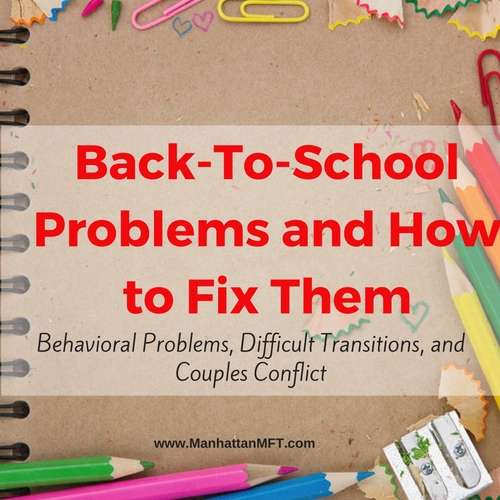Here are some common signs of a difficult transition:
It’s not uncommon to find yourself at odds with your partner. Maybe you had different school experiences. Maybe one of you enjoyed school and flourished while the other couldn’t stand school and struggled academically or socially. Perhaps one of you pushes education as the highest priority while the other thinks it’s best not to pressure kids academically. Most likely those differences affect the way you view your own children’s schooling. Teamwork when parenting is crucial! When there is any type of change, parents must present a united front to the kids. You may not always agree with your partner. That’s perfectly normal and okay, but for the kids’ sake it’s best to stick together. You have to trust your partner is a good parent. You both have your child’s best interests at heart. What you and your partner think is the best way to get from point A to point B may sometimes be different. Get on the same page! This may mean meeting half way and coming to a compromise. It's less stressful on the kids when you are parenting together. Openly arguing about issues that concern them can oftentimes create anxiety or feelings of instability. Going to school is already difficult for kids, so let's make it less stressful on them where we can. Battling with your kids over school-related struggles doesn't work very well. If you tried it, you know. Create a structured plan and let kids know what is expected of them. Children thrive on structure and routine. It’s less stressful when they know what to do and when to do it. Let them know when homework time is, when bedtime is, when they can use their electronics, etc. Make a school expectations chart. This gives your kids a visual reminder of the expectations set before them for the new school year. Most children are visual learners. A chart is something concrete they can be a part of. Here is a great resources for free printable behavior charts. Create a reward system that is age appropriate. We all work better when we have a goal we are working towards. Rewards do not have to cost money but should be able to motivate your child. (Examples: Playing a game with the family after dinner, choosing a meal one evening, staying up 15 minutes later, having a few extra minutes of T.V. or electronics time). If the school week feels extra long for your child consider putting a mid week special activity in place on a Wednesday, this way they have something to look forward to such as grabbing a smoothie after school or having a friend over for a few hours. Sit down as a family and have both parents (if applicable) discuss the back-to-school plan. Let the kids see that there is a united front and a clear agenda. This helps define the hierarchy of the parental subsystem. As parents you are in control and you make the rules. Kids may not always like that but it is what is best for them. Talk with your children about their feelings and fears over heading back to school. Let them know it's normal to feel nervous about the start of the school year. Talking about these types of feelings will help to reduce them. Help your kids develop coping skills to ease their fears and anxieties. A good way to aid children in verbalizing their feelings is giving them “complete the sentence” type prompts. For example, ask your child, “I feel nervous about …” or “I am worried about…” Have your kids keep a positivity journal about school. Have them write down 3 things a day they liked about school or were proud of themselves for. This helps them see them focus on the positive rather than the negative. Positive thoughts create positive feelings and positive actions. Help your child establish a support system in school. Introduce them to their guidance counselors or school psychologist. This way, if a problem does arise in school, they will feel safe and comfortable finding an adult to talk to. As you head into the school year, stay cool, calm, and collected. Children pick up on their parents’ emotional states. They are looking to you to set the tone. If things don’t go well and there are bumps in the road during the first few weeks, stay calm. Trust and follow the program you have created. Comments are closed.
|
Categories
All
Archives
March 2023
|
[email protected]


 RSS Feed
RSS Feed